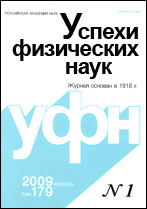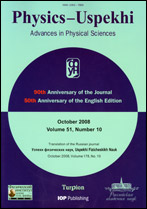|
This article is cited in 43 scientific papers (total in 44 papers)
PHYSICS OF OUR DAYS
Fluctuation kinetics of reactions
Ya. B. Zel'dovich, A. S. Mikhailov
Institute for Physical Problems of the USSR Academy of Sciences, Moscow
Abstract:
The fluctuation kinetics of reactions corresponds to a description of the reacting systems at a mesoscopic level. In this approach, a description is written in terms of concentration distributions which are continuous but fluctuating. The basic principles and methods of fluctuation kinetics are illustrated by several specific examples. Particular emphasis is placed on cases in which powerful mechanisms intensify microscopic fluctuations associated with the atomistic nature of the individual reaction events to the point that they determine the outcome of events at macroscopic scales. The situation is analogous to macroscopic quantum effects. In the first main section of the paper, the induction period of a branching chemical reaction is calculated under the assumption of a complete mixing of the reactants and also for the case with spatially inhomogeneous fluctuations. The second section of the paper discusses fluctuations in the course of a two-particle recombination reaction. The third section takes up the spontaneous breaking of chiral symmetry in the course of biological evolution and a possible role of fundamental weak interactions. Appendix I gives the solution of the general problem in which the point of a second-order phase transition in a distributed system is traversed at a finite rate. Appendix II describes mathematical methods of the fluctuation kinetics of reactions.
Citation:
Ya. B. Zel'dovich, A. S. Mikhailov, “Fluctuation kinetics of reactions”, UFN, 153:3 (1987), 469–496; Phys. Usp., 30:11 (1987), 977–992
Linking options:
https://www.mathnet.ru/eng/ufn8036 https://www.mathnet.ru/eng/ufn/v153/i3/p469
|


| Statistics & downloads: |
| Abstract page: | 77 | | Full-text PDF : | 32 |
|





 Contact us:
Contact us: Terms of Use
Terms of Use
 Registration to the website
Registration to the website Logotypes
Logotypes








 Citation in format
Citation in format 
